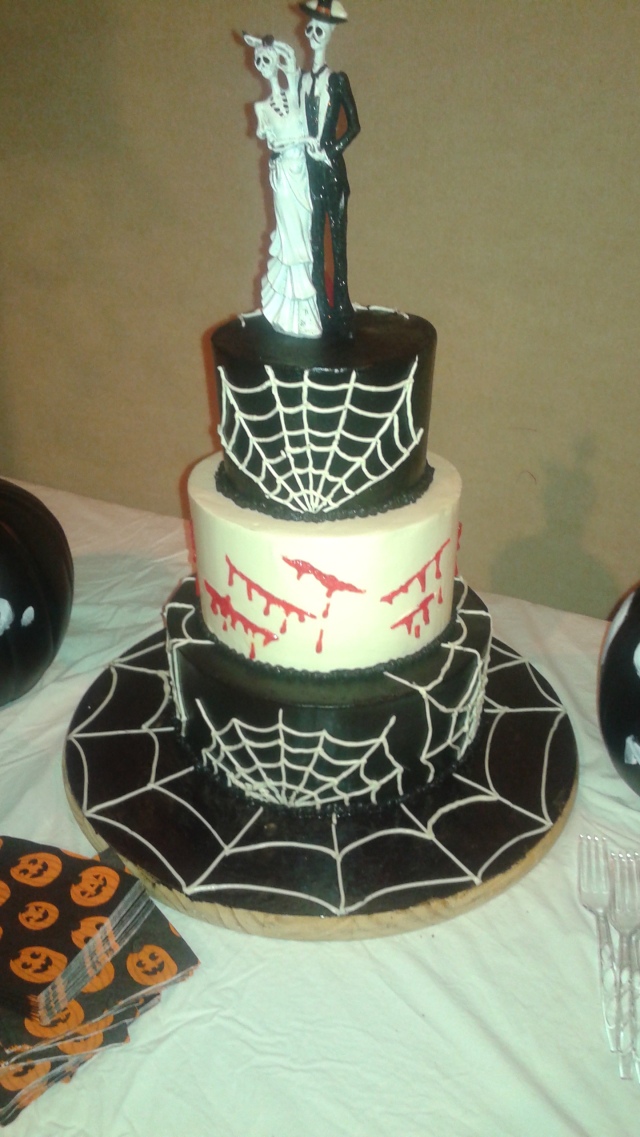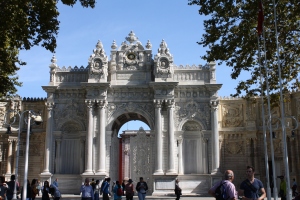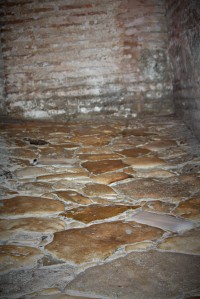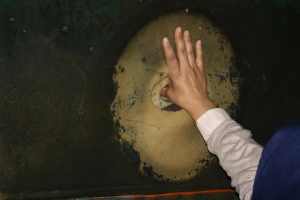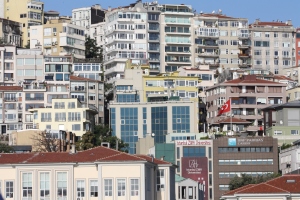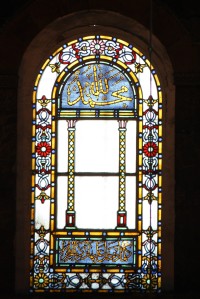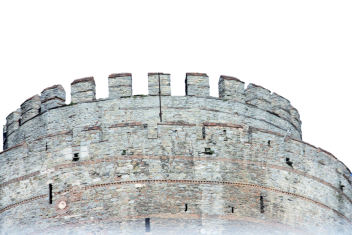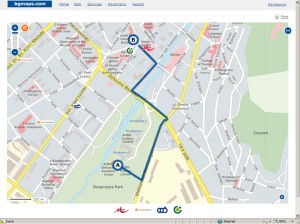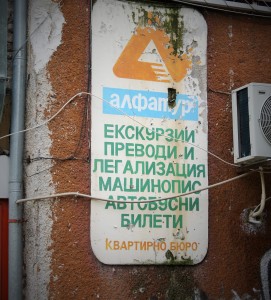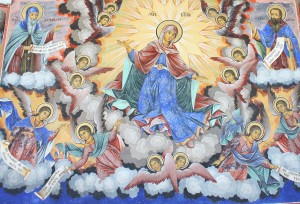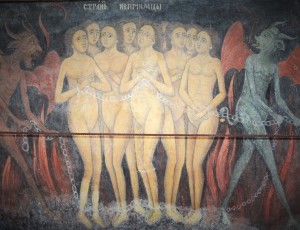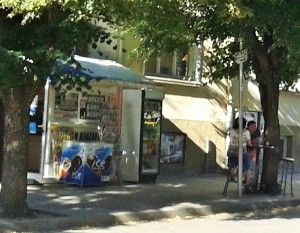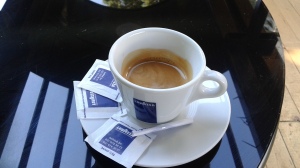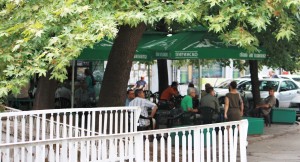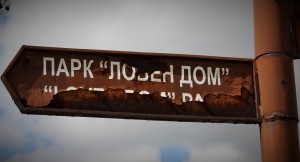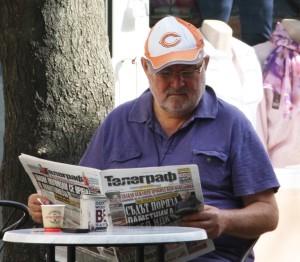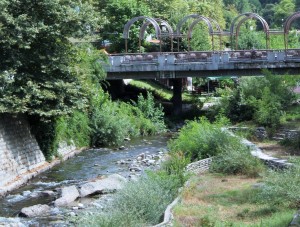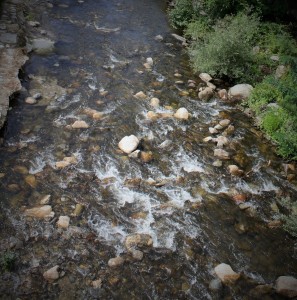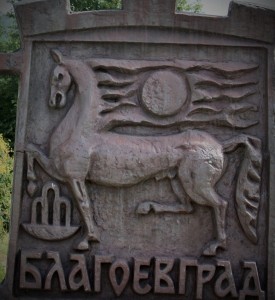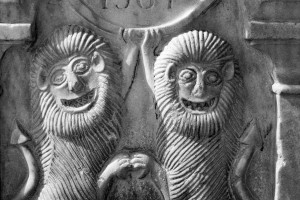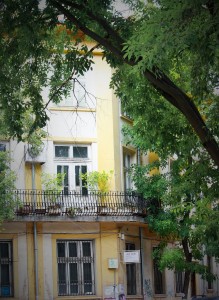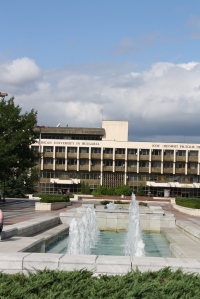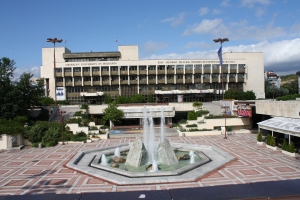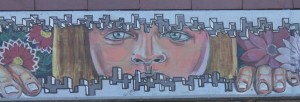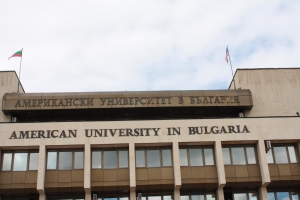[Writer interrupted: I wrote most of this entry some time ago but never got around to posting it, busy as I was with teaching and advising and my other writing. Oddly enough, as I post this now I am in Athens, Greece, where I have been invited to present a paper at a global arts conference. I will write about this trip to the birthplace of western civilization another time, but I find it mildly amusing that I am now posting my Macedonia entry while in the country that refuses to acknowledge Macedonia’s existence. Politics, what fun.]
As a country, Macedonia does not know who it is. 
It is either very old – history takes it back to the 6th Century – or very young (its most recent civil war was in 2001). In fact, it’s not even sure about its own name. Because Greece is still pissed about the country claiming the name of a long-standing Greek province (and more than a little perturbed about Macedonia declaring itself the true home of Greek hero Alexander The Great), officially Macedonia is represented in the United Nations as “the former Yugoslav Republic of Macedonia,” or more affectionately “FYROM.”
The people who live in FYROM, however, are very clear about their identity. They call themselves Macedonians and say their language is Macedonian, although they seem to quietly ignore the fact that the Macedonian alphabet and most of its vocabulary is Bulgarian. And given all their ancient but frequent history of being conquered and divided by Bulgarian tsars or being repeatedly told by their former Soviet Union masters that their only real enemy is the Imperialist Devil (aka, the United States), please understand my trepidation recently when I – an American living in Bulgaria – walked into several Macedonian high schools to preach the gospel of a liberal arts education. 

Officially, I was there on a recruitment tour on behalf of a university I hardly know. Unofficially, I was there to once again be a student of the world. I will probably never know if my official business was at all successful (though my handlers suggested I put on a good show), my attempt to once again travel and learn what I can about some of the world’s oldest civilizations was tremendously successful. I saw ancient fortresses,






walked across a bridge built around 500 BC,

strolled through a beautiful ancient market that was a probably a beautiful market when it was new, 

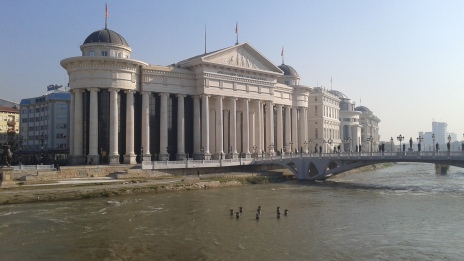 visited the house of a woman known as Teresa before she grew up, moved to India, and became a saint,
visited the house of a woman known as Teresa before she grew up, moved to India, and became a saint,
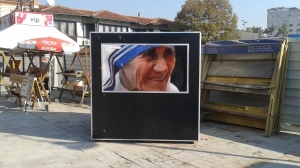

and partied with a group of young people who taught me a lot about Macedonian beer, slang and other contemporary traditions.

Macedonians Helping Me Understand Macedonia


I stayed in the old section of the nation’s capital, Skopje. If it was in the United States, the Hotel Kapistic might be called a ‘boutique’ hotel. 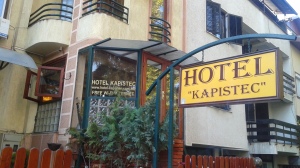 Here, it’s pretty normal – beautiful architecture, just a few floors, no elevator, all of the furniture (including the televisions) very old. I would have said the most modern part of the hotel was the bathroom, but only because it had a shower stall with real sliding doors. But the bathroom had a near-constant odor, something I might politely identify as sewage, a smell that reeked so badly that it woke me up in the middle of the night (that bathroom exhaust fan helped, but the fan was outrageously loud, almost unbearably so.
Here, it’s pretty normal – beautiful architecture, just a few floors, no elevator, all of the furniture (including the televisions) very old. I would have said the most modern part of the hotel was the bathroom, but only because it had a shower stall with real sliding doors. But the bathroom had a near-constant odor, something I might politely identify as sewage, a smell that reeked so badly that it woke me up in the middle of the night (that bathroom exhaust fan helped, but the fan was outrageously loud, almost unbearably so.
The owner’s wife laid out a pretty decent breakfast buffet each morning in a very charming and rustic nook/café/dining room. It was mostly the standard Eastern Europe fare of yogurt, fruit and raw vegetables, but on my first morning, as I was trying to see if a very old toaster might actually give me some toast (it did, but it took a long, long time), she poked her head out of the kitchen and asked me, “eggs?” I have long stopped wondering how people know I’m an American at first sight, but I nodded enthusiastically and very soon she brought me a large bowl of scrambled eggs. I ate in a beautiful antique-laden room overlooking the street and the nearby Embassy of the Republic of Iran.
I ate in a beautiful antique-laden room overlooking the street and the nearby Embassy of the Republic of Iran.
I ate there every morning for four days, not once did I see the Ayatollah.
The Greek dispute is probably not going away anytime soon, especially since Macedonia built a gigantic (gigantean?) statue to Alexander the Great in the heart of Skopje.
 Really, it is enormous, maybe 20 stories high, and adorned with a circle of truly over-the-top bas reliefs depicting the history of old Alex’s relationship to Macedonia (not Greece, by God!).
Really, it is enormous, maybe 20 stories high, and adorned with a circle of truly over-the-top bas reliefs depicting the history of old Alex’s relationship to Macedonia (not Greece, by God!).

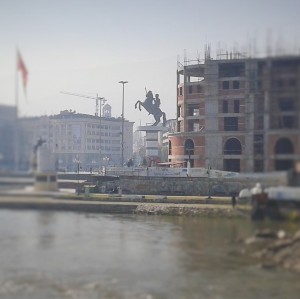

Alexander is on a horse, of course, and is shown with sword raised, clearly ready for battle. Macedonia is not saying anything otherwise, but the general conspiracy theory is that it’s not a coincidence that his sword is raised toward the general geographic direction, as it were, of Greece.
We visited seven high schools. Each was very different, but in every case we met with a teacher and/or administrator who spoke some level of English (the most fluent by far was a fascinating English teacher who, in another life, was an official translator for the U.S. Army during the Albanian / Kosovo conflicts). 

We then met with either a large or very small group of kids who had been studying English for practically their entire lives. They all signed up to meet with us because they had some interest in studying abroad, and while going to an American university in Bulgaria is probably not at the top of their foreign university wish list, the financial reality of life means that, for many of them, AUBG might be as close as they will actually get to attending an American school.
My role at these sessions was essentially show-and-tell. The official AUBG recruitment officers were very good in selling the school (in several languages); it truly was a pleasure to watch them work. And then after the sales pitch, it was like the circus finale: “And now to prove we’re not making any of this up, here is a real life American professor!” All that was missing was a gong or cymbal crash.
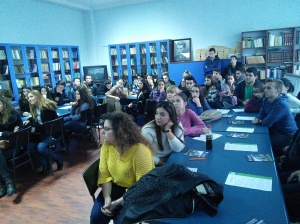


And so I talked to them about the American style of college education, which I was surprised to learn is actually fairly rare in Europe. Kids generally go to college and study one subject. Taking classes in both science and humanities or having a double major is just not done (AUBG is, in fact, the only liberal arts college in Bulgaria).

My AUBG Handlers / Road Crew / Hosts
But mostly I answered questions about writing and about Chicago, specifically about the Chicago Bulls. The knowledgeable in the crowd knew that Michael Jordan retired a long time ago, but that didn’t stop them from asking if I ever saw Jordan in person (yes I did), if he still lives in Chicago (sometimes, though I’m not sure) or how big was the statue to Jordan outside the United Center (not as big as the one to Alexander the Great). The last one got a few laughs, but I have to admit it made me think about which direction Jordan is facing as he makes his bronze leap over some imagined opponent. Perhaps he is facing the general direction that is, I don’t know, New York? Fans of the New York Knicks should probably look into that.

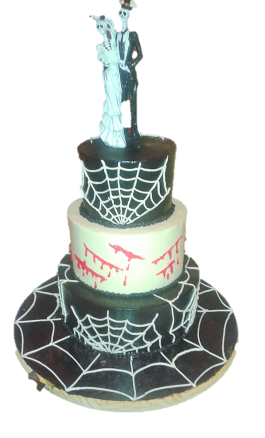 Casey and Nicole were married Oct. 31, 2015, Halloween Night, and no matter the archaic notions surrounding that date – the night of the living dead and all that – the wedding was nothing but a really fun party. In costume. In the woods. In the dark.
Casey and Nicole were married Oct. 31, 2015, Halloween Night, and no matter the archaic notions surrounding that date – the night of the living dead and all that – the wedding was nothing but a really fun party. In costume. In the woods. In the dark.

 It was raining and so I found Casey and Nicole adjusting their outdoor wedding plans for indoors. It was great to see them again, and I was happy they had many friends on hand helping them. I felt bad about the weather not cooperating, but the wedding couple were in good spirits and seemed well prepared.
It was raining and so I found Casey and Nicole adjusting their outdoor wedding plans for indoors. It was great to see them again, and I was happy they had many friends on hand helping them. I felt bad about the weather not cooperating, but the wedding couple were in good spirits and seemed well prepared.






